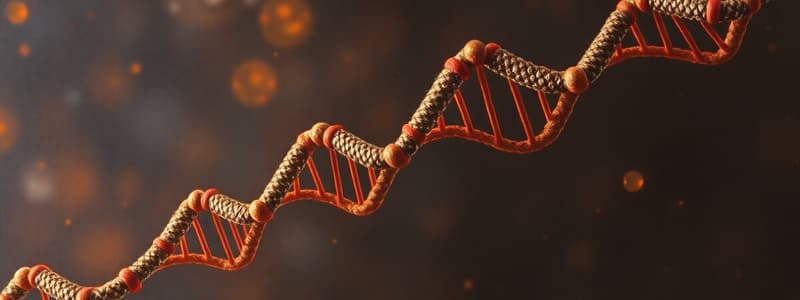Podcast
Questions and Answers
What is the role of nucleoside 5'-triphosphates in metabolism?
What is the role of nucleoside 5'-triphosphates in metabolism?
- They facilitate cellular communication.
- They act as enzymes.
- They are structural components of nucleic acids.
- They serve as energy carriers. (correct)
Which nucleoside triphosphate is primarily involved in carbohydrate metabolism?
Which nucleoside triphosphate is primarily involved in carbohydrate metabolism?
- CTP
- UTP (correct)
- GTP
- ATP
What type of bond forms between nucleotides in a nucleic acid chain?
What type of bond forms between nucleotides in a nucleic acid chain?
- Hydrogen bonds
- Covalent bonds
- 3',5'-Phosphodiester bridges (correct)
- Ionic bonds
Which process is primarily linked with the action of ATP?
Which process is primarily linked with the action of ATP?
What is a common function of cyclic nucleotides?
What is a common function of cyclic nucleotides?
Which of the following is NOT a direct function of nucleoside 5'-triphosphates?
Which of the following is NOT a direct function of nucleoside 5'-triphosphates?
What characterizes the structure of DNA as compared to RNA?
What characterizes the structure of DNA as compared to RNA?
Which type of RNA is responsible for carrying the message for protein synthesis?
Which type of RNA is responsible for carrying the message for protein synthesis?
Which of the following statements accurately describes nucleic acids?
Which of the following statements accurately describes nucleic acids?
What is the complementary DNA sequence for the segment ATCGGCTAAGC written in the 3′-to-5′ direction?
What is the complementary DNA sequence for the segment ATCGGCTAAGC written in the 3′-to-5′ direction?
Erwin Chargaff's observations indicated which of the following relationships in DNA?
Erwin Chargaff's observations indicated which of the following relationships in DNA?
Which statement about the base pairs in DNA is true?
Which statement about the base pairs in DNA is true?
What is the effect of hydroxide ion (OH-) on the C'2 hydroxyl group during RNA hydrolysis?
What is the effect of hydroxide ion (OH-) on the C'2 hydroxyl group during RNA hydrolysis?
What is a major factor contributing to the stability of the DNA double helix?
What is a major factor contributing to the stability of the DNA double helix?
What is a product of the hydrolysis of RNA following the creation of a cyclic nucleotide?
What is a product of the hydrolysis of RNA following the creation of a cyclic nucleotide?
Which of the following statements regarding RNA and DNA sugars is correct?
Which of the following statements regarding RNA and DNA sugars is correct?
Which statement correctly describes semiconservative replication of DNA?
Which statement correctly describes semiconservative replication of DNA?
Which statement about the direction nucleic acids are written in is false?
Which statement about the direction nucleic acids are written in is false?
What role do van der Waals forces play in DNA structure?
What role do van der Waals forces play in DNA structure?
What role does DNA polymerase play in DNA synthesis?
What role does DNA polymerase play in DNA synthesis?
What direction does chain elongation proceed during DNA synthesis?
What direction does chain elongation proceed during DNA synthesis?
What activity do many DNA polymerases possess to ensure accuracy during synthesis?
What activity do many DNA polymerases possess to ensure accuracy during synthesis?
How do some viruses replicate their RNA genomes?
How do some viruses replicate their RNA genomes?
What is the primary role of transfer RNA (tRNA) in gene expression?
What is the primary role of transfer RNA (tRNA) in gene expression?
Which statement accurately describes the function of ribosomal RNA (rRNA)?
Which statement accurately describes the function of ribosomal RNA (rRNA)?
Which of the following accurately identifies the result of the transcription process?
Which of the following accurately identifies the result of the transcription process?
What is the main requirement for RNA polymerase to synthesize RNA?
What is the main requirement for RNA polymerase to synthesize RNA?
What distinguishes retroviruses from other types of viruses?
What distinguishes retroviruses from other types of viruses?
Which RNA type is most abundant in E.coli, according to the relative amounts provided?
Which RNA type is most abundant in E.coli, according to the relative amounts provided?
In what direction does RNA synthesis occur?
In what direction does RNA synthesis occur?
What does reverse transcriptase specifically do in retroviruses?
What does reverse transcriptase specifically do in retroviruses?
What drives the synthesis of RNA during elongation?
What drives the synthesis of RNA during elongation?
If the DNA template strand is 3'–TCAAGGCGA–5', what is the resulting mRNA sequence?
If the DNA template strand is 3'–TCAAGGCGA–5', what is the resulting mRNA sequence?
What characterizes the promoter sites for transcription?
What characterizes the promoter sites for transcription?
What is the role of the terminator sequence in transcription?
What is the role of the terminator sequence in transcription?
Which of the following best describes the structure of the terminator sequence in prokaryotes?
Which of the following best describes the structure of the terminator sequence in prokaryotes?
Which sequence is a common promoter element in eukaryotes?
Which sequence is a common promoter element in eukaryotes?
How does RNA polymerase recognize where to start transcription?
How does RNA polymerase recognize where to start transcription?
What is the significance of the base composition found in newly synthesized RNA?
What is the significance of the base composition found in newly synthesized RNA?
Flashcards are hidden until you start studying
Study Notes
Nucleoside 5'-Triphosphates Are Carriers of Chemical Energy
- Nucleoside 5'-triphosphates are critical for metabolism due to their high-energy phosphoric anhydride bonds
- The bases in nucleotides serve as recognition units
- Cyclic nucleotides act as signal molecules and regulators of cellular processes
- ATP is essential for energy metabolism
- GTP drives protein synthesis
- CTP drives lipid synthesis
- UTP drives carbohydrate metabolism
The Structure of a Nucleic Acid Chain Can Be Simplified
- Nucleic acid chains are represented by the sequence of their bases
3',5'-Phosphodiester bridges link nucleotides together to form polynucleotide chains.
- The 5'-ends of the chains are at the top; the 3'-ends are at the bottom.
What Are the Different Classes of Nucleic Acids?
- DNA exists in one form and has one primary purpose
- RNA exists in three (or four) types and has three (or four) purposes
- Ribosomal RNA (rRNA) forms the structural and functional basis of ribosomes
- Messenger RNA (mRNA) carries the genetic code for protein synthesis
- Transfer RNA (tRNA) carries amino acids to the ribosomes for protein synthesis
- Other types include small nuclear RNA and small non-coding RNAs
The Structure of DNA
- Each phosphodiester bridge in a nucleic acid backbone has a negative charge
- Nucleosides consist of a base bonded to a sugar
- DNA contains the bases adenine (A), thymine (T), guanine (G), and cytosine (C)
- Nucleic acids are conventionally written in the 5'-to-3' direction
Base Pairing in DNA
- Guanine pairs with cytosine (G:C)
- Adenine pairs with thymine (A:T)
- The base pairs have similar shapes
- Hydrogen bonds hold the base pairs together
Chargaff's Rules
- The A:T and G:C ratios are nearly 1:1 in different organisms
- The A:G ratio varies between organisms
Stability of the Double Helix
- Base stacking contributes to the stability of the double helix due to hydrophobic interactions
- Van der Waals forces also stabilize stacked base pairs
DNA Replication
- DNA replication involves the unwinding of the double helix and separation of the two strands
- Each strand serves as a template for the synthesis of a new complementary strand
- DNA polymerase catalyzes the addition of nucleotides to the growing strand in a 5'-to-3' direction
- The process is semiconservative, meaning that each new helix contains one parental strand and one newly synthesized strand
RNA
- RNA is less susceptible to hydrolysis by dilute base than DNA due to its shorter glycosidic bond
- Hydrolysis of RNA by dilute base involves:
- An OH- abstracts a proton from the C'2 hydroxyl group
- The charged oxygen attacks the positive phosphorus, breaking the phosphodiester bond
- The cyclic nucleotide is hydrolyzed by water to form a mixture of 2'- and 3'-monophosphate derivatives
Gene Expression
- Gene expression is the process of converting genetic information from DNA into functional molecules
- It involves two steps:
- Transcription: DNA is transcribed into mRNA
- Translation: mRNA is translated into proteins
Types of RNA
- Messenger RNA (mRNA): serves as a template for protein synthesis
- Transfer RNA (tRNA): carries amino acids to the ribosome for protein synthesis
- Ribosomal RNA (rRNA): forms the major component of ribosomes and acts as a catalyst for protein synthesis
RNA Polymerase
- RNA polymerase synthesizes RNA from a DNA template
- It does not require a primer
- The process involves the elongation of the RNA strand in a 5'-to-3' direction using ribonucleoside triphosphates (ATP, GTP, UTP, and CTP)
- The reaction is driven by pyrophosphate hydrolysis
Transcription
- Transcription begins at promoter sites and ends at terminator sites
- Promoter sites are regions on DNA that bind RNA polymerase and determine the start of transcription
- Terminator sequences are regions that signal the end of transcription
Promoter Sites
- Prokaryotes: Pribnow box (-10 region), -35 region
- Eukaryotes: TATA box (Hogness box), CAAT box
Transcription Termination
- Prokaryotes: terminator sequences or rho protein
- Eukaryotes: less well-defined, may involve specific sequences or protein factors
- Terminator sequences often involve a stem-loop structure followed by a sequence of U residues
Complementarity Between DNA and RNA
- The base sequence of mRNA is complementary to the template strand of DNA
- Uracil (U) in RNA replaces thymine (T) in DNA
Key Characteristics of DNA Synthesis
- Requires four deoxynucleoside 5'-triphosphates and Mg2+
- Occurs on a pre-existing DNA template
- Requires a primer to initiate synthesis
- Chain elongation proceeds in the 5'-to-3' direction
- Many DNA polymerases have nuclease activity to remove mismatched nucleotides
Viral RNA Genomes
- Some viruses have RNA genomes that are replicated by RNA-directed RNA polymerases
- Retroviruses have single-stranded RNA genomes that are converted to DNA by reverse transcriptase
Hypochromism
- Hypochromism is the decrease in UV absorbance at 260 nm when DNA is in a double-stranded form
- This phenomenon is due to stacking interactions between base pairs
- It is an indication of the double helix formation
X-Ray Diffraction of DNA
- X-ray diffraction studies provided essential information about DNA structure
- They revealed that DNA is a double helix with a helical structure
Importance of Chargaff's Discovery
- Chargaff's discovery of the equivalence of A and T, and G and C, was essential for understanding DNA structure
- It supported the idea of base pairing in DNA and provided evidence for the Watson-Crick model
Semiconservative Replication
- DNA replication is semiconservative, meaning each new DNA molecule contains one parental strand and one newly synthesized strand
Studying That Suits You
Use AI to generate personalized quizzes and flashcards to suit your learning preferences.




